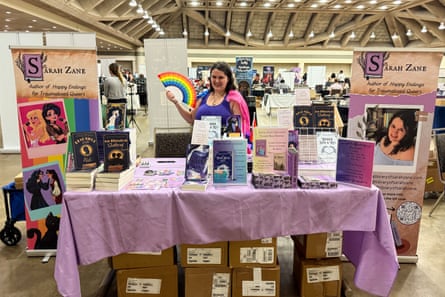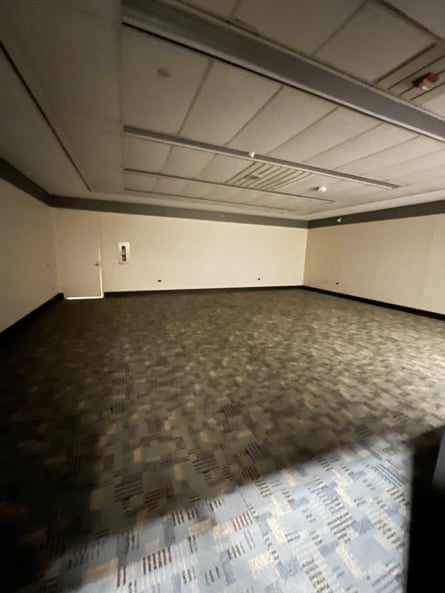In the days leading up to the A Million Lives book festival, things already seemed amiss. Grace Marsceau, the event organizer, messaged an attending author that the DJ was in the hospital and the company had no replacement. She owed the hotel “six figures” because the room block hadn’t sold out, according to messages.
“Oh my gosh that’s awful!” author Sarah Zane responded. The excuses seemed unusual, but as a veteran of book events, Zane expected to deal with some mismanagement.
“I started to get worried,” Zane said in an interview with the Guardian, “But I did not expect things to be so visibly wrong.”
On a Discord channel for the event, Marsceau repeatedly assured everyone about the event. In January, she said ticket sales were already “in the high four hundreds and I am aiming to sell out”. By the end of April, she messaged that ticket sales were in the “high 500s low 600s”.
Attendance estimates help authors decide how many copies of their books to bring to an event. The two-day festival at the Baltimore convention center cost writers $50-$150 for the table, which is in addition to the cost of gas, flights, hotel rooms and books. Many spent more than $1,000 to attend, they said, an investment these independent authors believed worth it to sell their books.
“I make my whole living on events, this is my life blood,” said Kalista Neith, a popular dark romance author.
Neith had agreed to attend as a featured author – meaning her hotel was covered and she’d receive a $1,000 payment. Her attendance also gave other authors confidence in the event. In total, about 100 authors signed up.
“The second I saw that Kalista Neith and Perci Jay had signed on to this I was like, ‘OK, this is gonna be a good event,’” said Zane.

But last week, Marsceau told Neith that the Hilton was not returning her calls so she was going to move her to a Days Inn. Neith didn’t mind. After check-in, the front desk informed her that Marsceau’s credit card to cover the room had been declined. When Neith called Marsceau, she said her identity had been stolen.
By then, Neith had her doubts, but she’d already told her followers about the festival and left the hotel to get her table set up. As she and other authors arrived at the convention center, there was no signage to direct them to the event. Marsceau wasn’t there, and there weren’t any event staff or volunteers. The original map of booths was not up to fire code, a security guard informed them, so everything had to be rearranged that morning. There were no coverings for the booths or badges that are typical of any conference. When Marsceau finally arrived, Zane asked her why they didn’t have badges or wristbands.
The badges had arrived “shattered”, Marsceau informed Zane. Later, she told attendees that she had memorized everyone’s faces and knew who was supposed to be there, according to interviews.
When the festival finally got started on Friday, no one walked through the door. One talk had more authors on the panel (nine) than people in attendance (eight). A tattoo artist wasn’t provided with an electrical outlet and had to borrow a battery pack in order to work. And an advertised “content room” was just a bare room with a gray carpet.
Some attenders, like Susan Alexander, a first-time author and mom of two who drove from Indiana said she was hesitant to be critical. When Marsceau asked her for feedback that day about the event, Alexander demurred.
“It can be really scary as a first-time author to voice your concerns. You don’t want to be blackballed from other events,” she said.
Other authors said in interviews they tried to convince themselves that Friday was just slow and things would improve. Instead, things only devolved further.
On Saturday, the content room was shut down for “mechanical failure”, Marsceau told attendees. At a panel on LGBTQ+ diversity, the moderator left to take a phone call in the middle and then never returned. Attenders later recognized the moderator as Marsceau’s husband from a photo of the couple in a news story.
It is unclear if Marsceau formally created a business entity for her company Archer Fantasy events or Archer management – the names her accounts use. The Guardian found no secretary of state filings that listed Marsceau as an officer or entities under those business names. Marsceau did not respond to multiple calls for comment.

Despite the fiasco, Alyssa McCoy who owns a business selling book-themed drinkware and apparel was set on attending the Saturday night ball to celebrate her birthday that weekend. She and her friends got ready together in one of their hotel rooms while watching Twilight. “I was always going to the ball, I loved my dress,” she said.
But when they arrived at the same brightly lit conference room as the event, there was no decor or music. A small cash bar and a plate of macarons were the only signs of a party. As they sat around in chairs, the security guard went home to retrieve his portable bluetooth speaker. They named him “DJ Steve” and took turns playing music from their phones.
Neith was irate for her fans that had paid up to $200 for the ball when she arrived and saw nothing was there.
“Me taking a loss because this was a rubbish event is one thing, but not delivering on anything for my readers is a completely different thing,” she said. “All I have is the trust of my readers.”
Neith told Marsceau the event was unacceptable and instructed her to make a post promising refunds and to tag her in it.
“Hi everyone, I want to issue a formal apology,” Marsceau said carefully in a video on Saturday as Neith stood nearby.
Neith said she was “still in disbelief how bad this was and it wasn’t just cancelled”.
Marsceau has said she will issue refunds by the end of the month and maintains that she sold 603 tickets, according to emails. In interviews, authors estimated 80-100 people showed up the entire weekend.

.png) 10 hours ago
4
10 hours ago
4













































